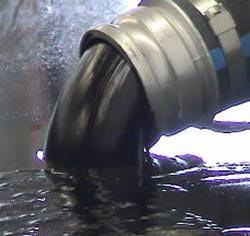The Nigerian Navy has faulted figures of crude oil being stolen daily in Nigeria by oil thieves as claimed by the Nigerian National Petroleum Corporation Limited.
This is coming barely two months after the Comptroller-General of Customs, Hameed Ali, also faulted the state oil company for lying about the volume of premium motor spirit (petrol) being consumed in the country daily to warrant the over N6.34 trillion subsidy payment on the commodity annually.
The Navy asked the NNPCL to tell Nigerians the truth about the low level of oil production and instead of reeling out figures, which very far from reality.
It also accused the NNPCL of hiding the real cause of fuel scarcity in the country by continually blaming it on oil theft.
The Group General Manager, National Petroleum Investment Management Services (NAPMS), an agency under the NNPCL, recently claimed that the oil giant loses about 470,000 barrels per day amounting to $700 million monthly.
However, the Chief of Training and Operations of the Nigerian Navy, Rear Admiral Solomon Agada, faulted the NNPCL claim when he appeared before the Senate Committee on Anti-Corruption and Other Financial Crime for an interactive session last Thursday.
The committee had met with relevant anti-corruption agencies implementing the Proceeds of Crime (recovery and management) Act 2022.
Agada revealed that at several meetings with the NNPCL, they had apprised the corporation about the causes of fuel scarcity by intimating them that there was no way anyone would steal 100,000 barrels of oil in a day but the NNPCL had deliberately continued to mislead Nigerians.
The Chairman of the Committee, Senator Abdu Suleiman Kwari had asked the naval chief to explain why the country continued to experience cases of oil theft if the nation’s waterways are being safeguarded as Agada claimed.
Kwari said, “The oil theft issue has been a very worrisome one to every Nigerian and more importantly, it has negatively impacted on our economy. How come the navy hasn’t been able to solve the issue of oil theft and if the Navy is claiming that the waterways were secured, why are there still cases of oil theft?”
In his response, Agada said, “The challenge is that because of the criminal activity in-shore by the illegal refiners in tapping into the export lines. Those export lines have not been in operation since early this year.
“The major terminals have not been able to process fuel for export since around February/March (this year) and instead of the NNPCL telling the Federal Government that this product is not brought out to be able to process as export, they say the oil was stolen.”
Agada added that the argument of the Navy has been that NNPCL should tell people the difference between the oil that they have shut in and not brought out and what is being stolen.
“The stolen produce that we have been dealing with among illegal refineries is nothing compared to what NNPCL is declaring as being stolen. If you’re talking about stealing 100,000 barrels of crude oil in a day, you will need about five-tonne barges 20 times a day from the creek to the high sea which is very unrealistic.
“I told them in NNPCL that if that were to be the case, even a blind man will observe that something is happening in Nigeria’s water and we are there on patrol and not seeing this.
“The only reasonable explanation why the fuels are not coming out is because the Shell platform in Bonny Island is not exporting and the Chevron terminal in Escravos is also not exporting. All these things are very clear but because it is easier to say these things are stolen, then they just come up with that.
“Let’s get someone who can do proper analysis to say with these figures we have found these claims are just bogus, nothing substantive about it. We have communicated appropriately with NNPCL, even at our last interface with them they agreed with us but when they come to the public they say oil theft, hiding the fact from the public.”
Copyright Ships & Ports Ltd. Permission to use quotations from this article is granted subject to appropriate credit given to www.shipsandports.com.ng as the source.
